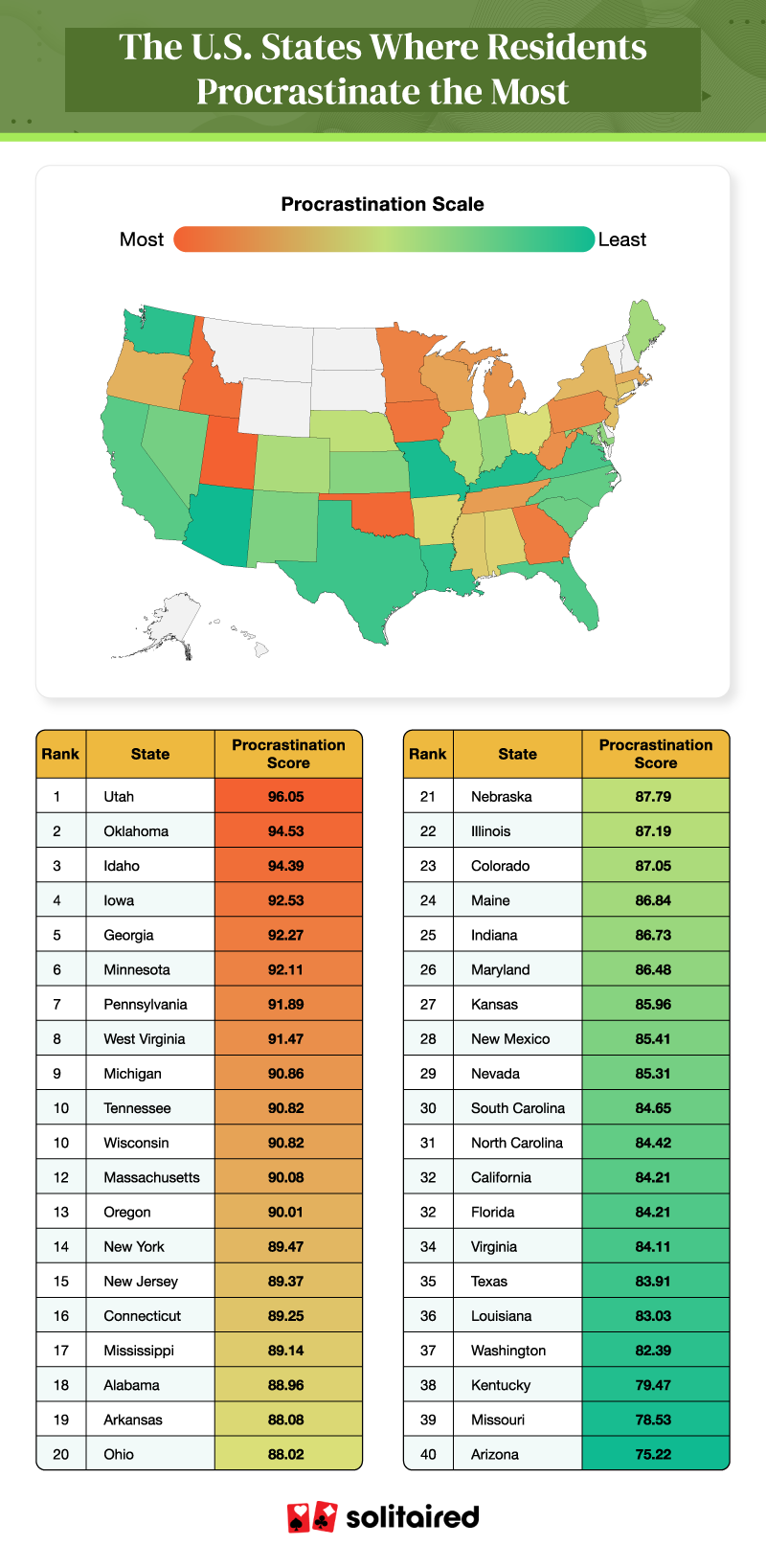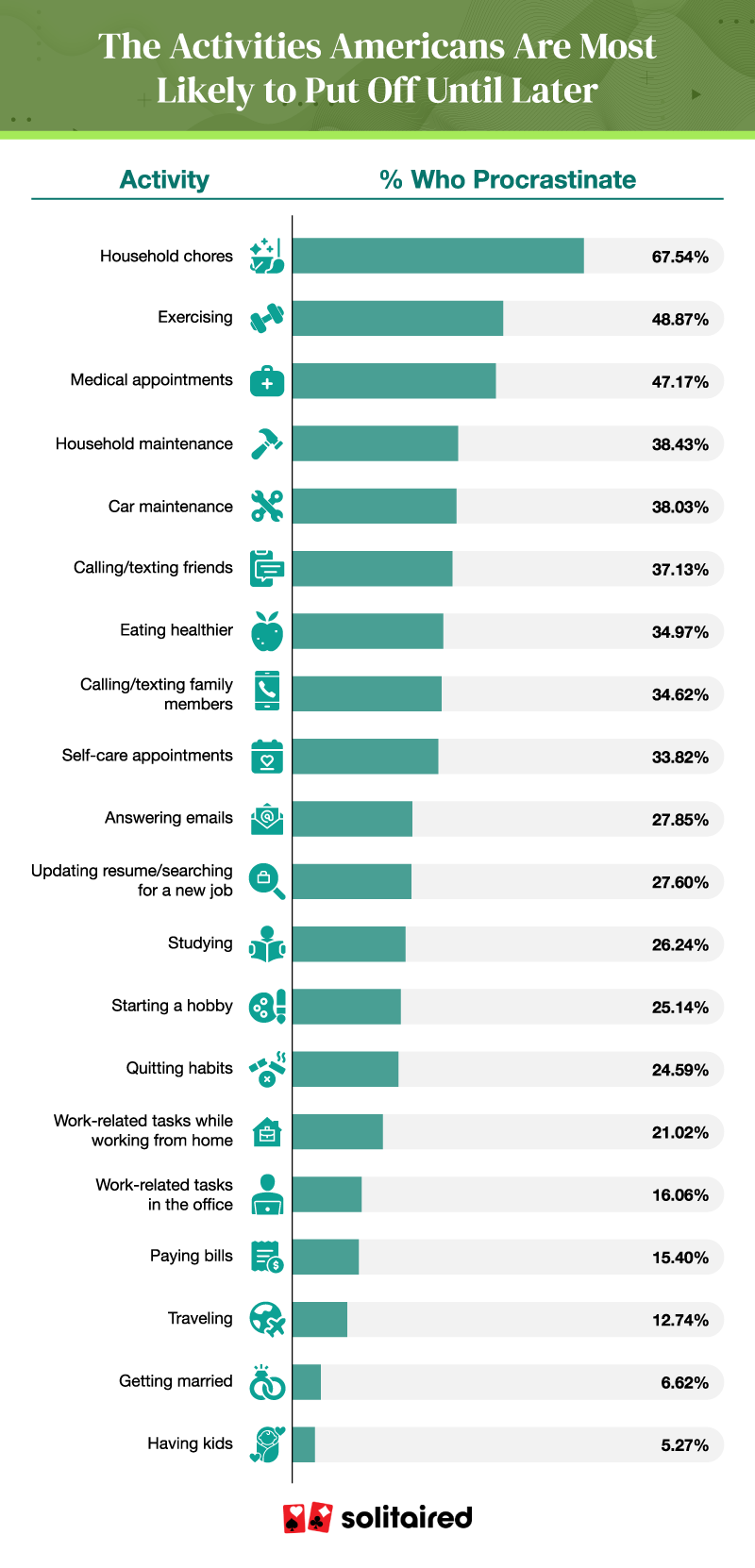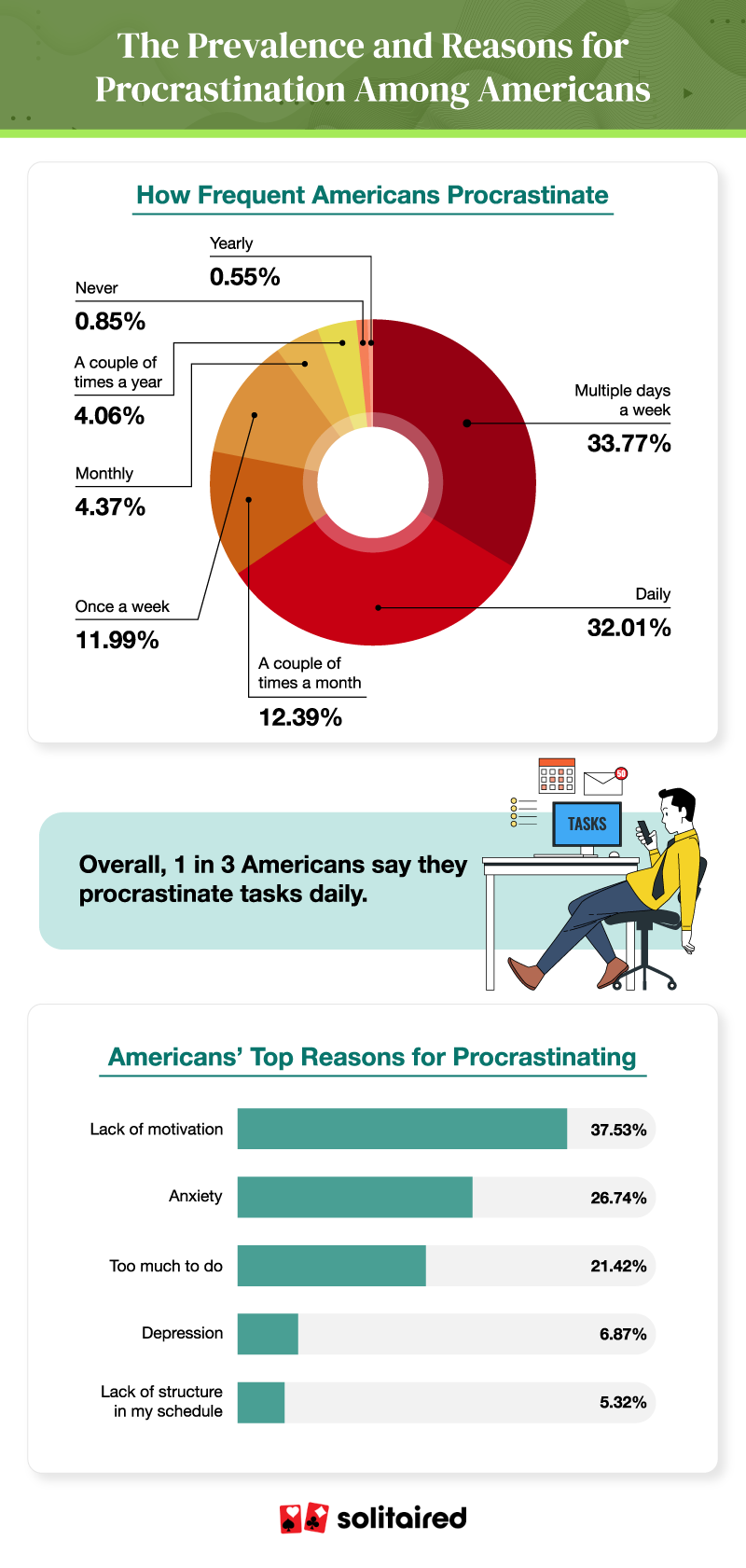The States with the Worst Procrastinators
By Neal Taparia - Published: 04/30/2024

Sometimes it feels like there aren’t enough hours in the day to get everything done, but many Americans still find themselves putting off tasks on their to-do lists. We know first hand with my of our users choosing to play online solitaire instead of their task at hand. Procrastination can get the best of us at times, but which parts of the country are guilty of it most often? The team at Solitaired set out to determine just that.
In this study, we surveyed Americans in every state and asked various questions regarding their procrastination habits. Questions included everything from which tasks they put off most often, what causes them to procrastinate, how often they do it, and more. We then awarded points and created procrastination scores for each state using these responses. Read on to learn how your state ranked among the rest.
Key Takeaways
- Residents in Utah, Oklahoma, and Idaho are the most likely to procrastinate.
- Residents in Arizona, Missouri, and Kentucky are the least likely to procrastinate.
- When procrastinating, 78% of Americans say they have felt anxious.
- Americans are most likely to procrastinate household chores, exercise, and medical appointments.
- Overall, 99% of Americans admit to procrastinating tasks.
- Nearly 2 in 5 Americans say they would procrastinate less if social media didn't exist.
- A lack of motivation is the most common reason Americans procrastinate.
Where Americans Are Most Guilty of Procrastinating

Before we can start considering which parts of the country are the guiltiest of procrastinating, we need to understand what the term actually means. Procrastination is not simply putting off one task on your to-do list for another, but rather the unnecessary delay of important tasks and doing so knowing you will be worse off.
With this understanding in mind, we set out to determine which parts of the country are most likely to procrastinate on tasks and which are the most likely to get things done ASAP.
Utah leads the way with a procrastination score of 96.05 out of 100. Residents in the state are the most likely in the country to delay tasks at least once a week. To make matters worse, Utah residents are also the most impacted by anxiety when procrastinating tasks.
In second is Oklahoma with a score of 94.53 out of 100, as 1 in 2 residents admit they are likely to procrastinate on important tasks. Following closely behind in third with a score of 94.39 is Idaho. Residents in the Gem State are second behind Utah for anxiousness reports following the delay in duties.
On the other end of the spectrum, Arizona ranks first for the least likely to procrastinate, as residents in the state are the most unlikely in the country to procrastinate an important task. The second for the least procrastination is Missouri. Perhaps this is due to the 72% of residents who feel anxious while doing so.
The more often you procrastinate, the more likely others are to notice. Our study found that 1 in 4 Americans say their friends expect them to procrastinate on tasks. In addition, nearly 2 in 5 say their family expects them to put off tasks, and 1 in 12 say even their employer expects them to delay their duties.
So why do we do it? Experts suggest that procrastination of tasks is often associated with emotional self-regulation. It is common for negative feelings linked to certain tasks to keep us from completing the things on our to-do lists. After all, we typically jump at the opportunity to do the things we are excited about.
The Tasks People Are Most Likely to Procrastinate

After finding where Americans are procrastinating the most and least, we decided to turn our attention to the tasks being delayed most often. Topping our ranking is household chores. Many of us can relate to a sink full of dirty dishes or a laundry basket sitting in our room that we just don’t feel like dealing with right now.
Another relatable task Americans are delaying is exercising. Getting up and being active is easier said than done. And returning to the concept of emotional self-regulation, working out can be an unenjoyable experience for some people.
In third place for procrastinated tasks is medical appointments, followed by household maintenance and car maintenance. While procrastination can seem harmless, sometimes it can be a sign of low self-esteem and can lead to poor mental and physical health.
Our study found that Americans are also putting off things like starting a hobby and traveling. Both could eventually lead to fun and relaxation, but the process tends to be off-putting for many people. In addition, 1 in 20 Americans say they procrastinate getting married or having kids.
Sometimes procrastination goes beyond the general tasks that come to mind, so we decided to ask respondents to share examples of times they delayed tasks. Check out the interactive carousel below to see what some people are putting off.
How Often Do Americans Delay Tasks on Their To-Do Lists and Why?

Overall, 99% of Americans admit to procrastinating tasks, but how often are things being delayed? Our study found that when it comes to procrastination, Americans are most likely to delay tasks multiple times a week. On average though, 1 in 3 Americans say they procrastinate tasks daily, and in general women and Gen Zers are the most likely to fall into this category.
So what causes people to put off tasks, even those that are important? For nearly 2 in 5 people, it’s a lack of motivation keeping them from checking things off of their to-do lists. For another 1 in 4 people, it’s anxiety. Other common causes for procrastination according to Americans include having too much to do, depression, and a lack of structure in their schedules.
There are ways to try and overcome your tendency to procrastinate, however, according to experts. The first recommendation is to practice self-compassion. As we found in this study, most of the country admits to delaying tasks, but for some people procrastination causes them to feel guilty. Remember to be kind to yourself, as you are not the only person to do it.
Other recommendations include attaching meaning to a task, starting small, carefully choosing where to start, and more. So if you find yourself struggling to complete tasks on time, try one of these tips to help overcome procrastination.
Beat Your Battle With Procrastination
If you are someone who struggles with procrastination, remember that you are not alone. By taking the necessary steps, you can start marking things off of your to-do list in no time. One tip for overcoming procrastination is to reward yourself for accomplishments. So the next time you tackle a task, try rewarding yourself with a mentally stimulating game.
At Solitaired there are plenty of options including Pyramid Solitaire, FreeCell, Spider Solitaire, and TriPeaks, so regardless of your preferences, we have you covered. After the quick gaming break, you will be well-rested and ready to take on your next task.
Methodology
In this study, we surveyed Americans across the U.S. to determine which parts of the country procrastinate most often. We asked a variety of questions including how often they procrastinate, which tasks they are most likely to procrastinate, what causes them to procrastinate and more.
Using the responses, we awarded points to answers that represented procrastination. We then averaged points of residents in each state and various cities across the U.S. Finally, we adjusted scores on a scale of 0 to 100, with 100 representing the highest level of procrastination. We used these scores to rank states and cities accordingly.
About the author

